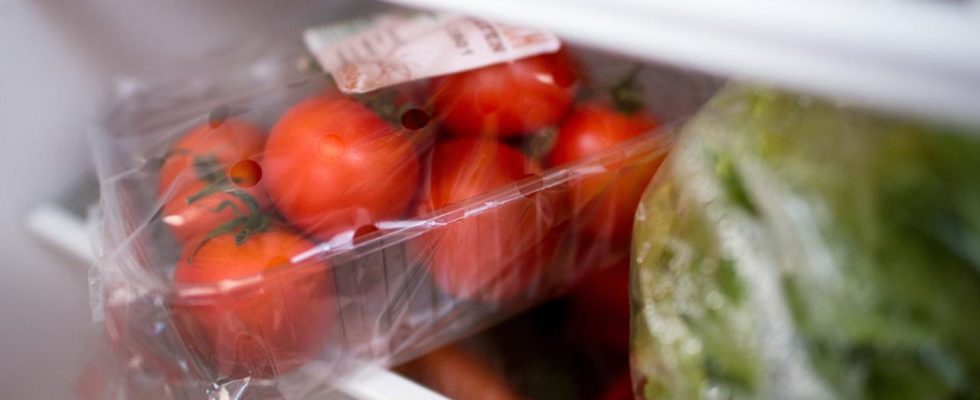Tomatoes in plastic, lettuce in bags – and often no reusable offer. The German Environmental Aid gave bad ratings to discounters and supermarkets in a “packaging check”.
Shopping in the supermarket or discounter quickly creates a lot of packaging waste. According to the German Environmental Aid (DUH), however, this is not due to the decisions of consumers. According to the lobby association, far too many goods are still being offered in packaging and disposable containers. In a “packaging check”, the association gave the supermarkets and discounters almost all bad ratings – only three tested organic chains got away with a good rating.
As the DUH reported, no reusable packaging was offered for milk and yoghurt products in five of the chains examined, and the rate in another shop was 97 percent. During the first check in early 2022, the DUH came to the same conclusion. The proportion of packaged fruit and vegetables has tended to decrease somewhat, but only by a few percentage points.
Aldi Nord and Süd as well as Lidl without reusable packaging
The criticism of Aldi Nord and Süd and Lidl was particularly harsh: the DUH did not find any reusable packaging on the milk shelves or in the range of drinks at the three discounters. In early 2022, things looked the same. The three discounters have not yet commented on the criticism.
“Our test visits show an unnecessarily large amount of disposables, too much plastic and waste. Even robust standard products such as carrots, apples or peppers are more often offered in disposable packaging than unpackaged,” said DUH Federal Managing Director Barbara Metz about the results. “If we don’t want to further intensify the plastic crisis, we need packaging waste to be halved by 2027 and an additional one-way tax of at least 20 cents on single-use plastic bottles, cans and beverage cartons.”
225.8 kilograms packaging waste per capita and year
Packaging waste has tended to increase in Germany in recent years. According to the Federal Environment Ministry, around 18.8 million tons of packaging waste were generated in 2020. Ten years earlier it was 16 million tons. Calculated per capita, every person in Germany uses 225.8 kilograms of packaging.
Paper, cardboard and cardboard make up more than 8.3 million tons of all packaging waste in Germany. Around 3.22 million tons of plastic waste were generated in 2020, glass waste more than three million tons. The development of aluminum from 90,600 tons in 2010 to almost 140,000 tons in 2020 is particularly striking.
“The proportion of one- and two-person households as well as senior citizens is increasing. Both result in smaller filling sizes and/or pre-portioned units being bought, which in turn has an increasing effect on packaging consumption,” writes the Federal Environment Agency online about the increase in packaging waste. In addition, eating and consuming habits have changed. Fast food, to-go products and ready meals continue to be very popular.
Sustainability is an important selling point for consumers
In its report, the DUH assumes that the sustainability of the products is an important selling point for many customers. “However, in order to be able to make a decision in the sense of the environment, you need the appropriate offer in the food retail trade,” it says. Although unpackaged shops are increasingly offering the option of shopping without packaging waste, especially in cities, their market share has so far been rather small.
The trade association HDE announced that the food trade is already actively committed to reducing packaging waste. “For example, all major food retailers have introduced reusable nets in the fruit and vegetable sector in order to reduce the number of very light bags. The reduction in material used in private label packaging through thinner-walled milk packaging or beverage bottles also contributes to the fact that less packaging is in circulation,” said Antje Gerstein, HDE Managing Director for European Policy and Sustainability, according to the announcement. In addition, the collection system for one-way beverage packaging that is subject to a deposit is very effective.
No trend reversal after new packaging law
A new packaging law has been in force since January, according to which many restaurateurs have to offer reusable packaging for take-away food. But things aren’t going smoothly yet: It wasn’t until mid-May that Federal Environment Minister Steffi Lemke called for stricter controls.
“The restaurateurs are asked to also fulfill their legal obligation to return more items, and municipalities and states should control much better,” said the Green politician at the time of the “Bild am Sonntag”.
Next construction site: food waste
The figures on packaging waste do not include the large amount of food that also ends up in the garbage can – in Germany it was around eleven million tons per year.
Almost 60 percent of this waste is generated in private households – that corresponds to almost 80 kilograms per person per year.

